Fleurs du Mal Magazine


Or see the index
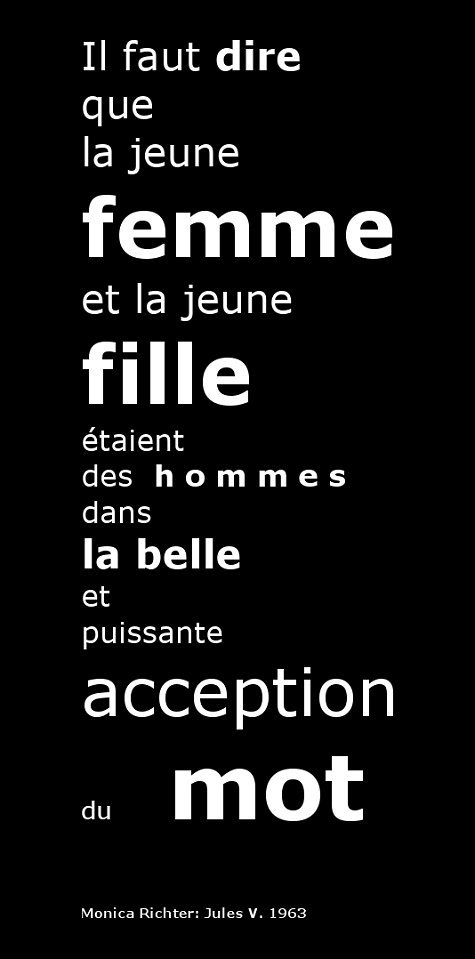
monica richter: il faut dire -jules v. 1963

monica richter: no
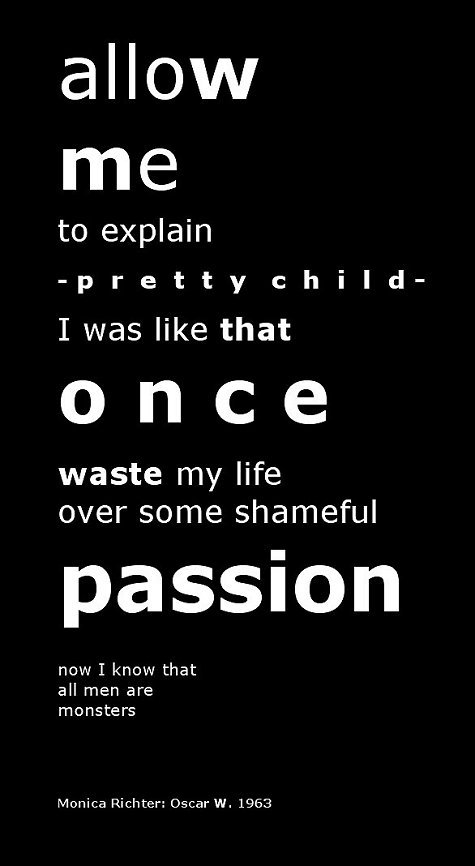
monica richter: allow me – oscar w. 1963

monica richter: nevermore – paul v. 1974
Monica Richter poetry – kempis poetry magazine
More in: *Concrete + Visual Poetry P-T, FLUXUS LEGACY, Monica Richter, Richter, Monica, Visual & Concrete Poetry, ZERO art
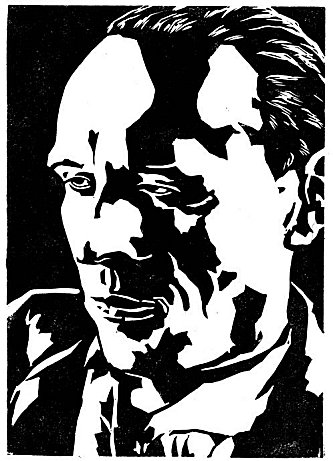
Lino: Ivo van Leeuwen
D a n i i l K h a r m s
(1905-1942)
fleursdumal.nl magazine
More in: Ivo van Leeuwen, Kharms (Charms), Daniil
.jpg)
Georg Trakl
(1887-1914)
Kaspar Hauser Lied
Für Bessie Loos
Er wahrlich liebte die Sonne, die purpurn den Hügel hinabstieg,
Die Wege des Walds, den singenden Schwarzvogel
Und die Freude des Grüns.
Ernsthaft war sein Wohnen im Schatten des Baums
Und rein sein Antlitz.
Gott sprach eine sanfte Flamme zu seinem Herzen:
O Mensch!
Stille fand sein Schritt die Stadt am Abend;
Die dunkle Klage seines Munds:
Ich will ein Reiter werden.
Ihm aber folgte Busch und Tier,
Haus und Dämmergarten weißer Menschen
Und sein Mörder suchte nach ihm.
Frühling und Sommer und schön der Herbst
Des Gerechten, sein leiser Schritt
An den dunklen Zimmern Träumender hin.
Nachts blieb er mit seinem Stern allein;
Sah, daß Schnee fiel in kahles Gezweig
Und im dämmernden Hausflur den Schatten des Mörders.
Silbern sank des Ungebornen Haupt hin.
.jpg)
Georg Trakl poetry
kempis poetry magazine
More in: Trakl, Georg
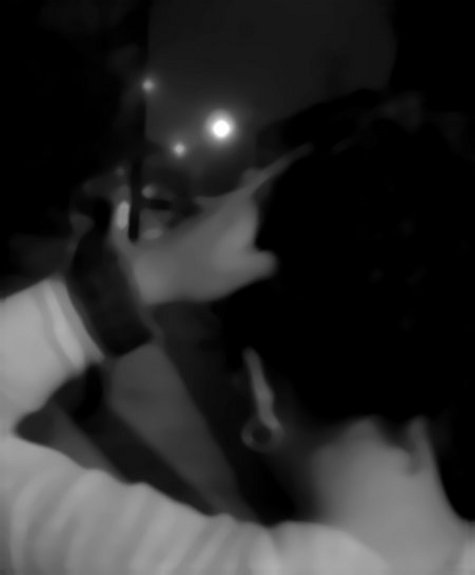
.jpg)
monica richter: pay day 1969

monica richter: what is this
Monica Richter poetry – kempis poetry magazine
More in: *Concrete + Visual Poetry P-T, FLUXUS LEGACY, Monica Richter, Richter, Monica, Visual & Concrete Poetry, ZERO art
.jpg)
James Joyce
(1882-1941)
This Heart That Flutters Near My Heart
This heart that flutters near my heart
My hope and all my riches is,
Unhappy when we draw apart
And happy between kiss and kiss:
My hope and all my riches — yes! —
And all my happiness.
For there, as in some mossy nest
The wrens will divers treasures keep,
I laid those treasures I possessed
Ere that mine eyes had learned to weep.
Shall we not be as wise as they
Though love live but a day?
Of That So Sweet Imprisonment
Of that so sweet imprisonment
My soul, dearest, is fain —
Soft arms that woo me to relent
And woo me to detain.
Ah, could they ever hold me there
Gladly were I a prisoner!
Dearest, through interwoven arms
By love made tremulous,
That night allures me where alarms
Nowise may trouble us;
But lseep to dreamier sleep be wed
Where soul with soul lies prisoned.
He Who Hath Glory Lost
He who hath glory lost, nor hath
Found any soul to fellow his,
Among his foes in scorn and wrath
Holding to ancient nobleness,
That high unconsortable one —
His love is his companion.
.jpg)
James Joyce poetry
kempis poetry magazine
More in: Joyce, James
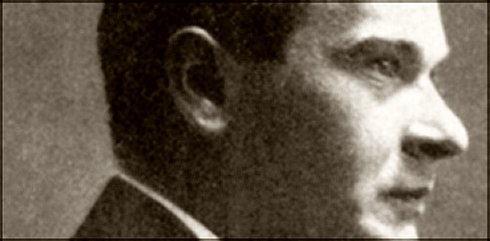
Georg Trakl
(1887-1914)
Frühling der Seele
Aufschrei im Schlaf; durch schwarze Gassen stürzt der Wind,
Das Blau des Frühlings winkt durch brechendes Geäst,
Purpurner Nachttau und es erlöschen rings die Sterne.
Grünlich dämmert der Fluß, silbern die alten Alleen
Und die Türme der Stadt. O sanfte Trunkenheit
Im gleitenden Kahn und die dunklen Rufe der Amsel
In kindlichen Gärten. Schon lichtet sich der rosige Flor.
Feierlich rauschen die Wasser. O die feuchten Schatten der Au,
Das schreitende Tier; Grünendes, Blütengezweig
Rührt die kristallene Stirne; schimmernder Schaukelkahn.
Leise tönt die Sonne im Rosengewölk am Hügel.
Groß ist die Stille des Tannenwalds, die ernsten Schatten am Fluß.
Reinheit! Reinheit! Wo sind die furchtbaren Pfade des Todes,
Des grauen steinernen Schweigens, die Felsen der Nacht
Und die friedlosen Schatten? Strahlender Sonnenabgrund.
Schwester, da ich dich fand an einsamer Lichtung
Des Waldes und Mittag war und groß das Schweigen des Tiers;
Weiße unter wilder Eiche, und es blühte silbern der Dorn.
Gewaltiges Sterben und die singende Flamme im Herzen.
Dunkler umfließen die Wasser die schönen Spiele der Fische.
Stunde der Trauer, schweigender Anblick der Sonne;
Es ist die Seele ein Fremdes auf Erden. Geistlich dämmert
Bläue über dem verhauenen Wald und es läutet
Lange eine dunkle Glocke im Dorf; friedlich Geleit.
Stille blüht die Myrthe über den weißen Lidern des Toten.
Leise tönen die Wasser im sinkenden Nachmittag
Und es grünet dunkler die Wildnis am Ufer, Freude im rosigen Wind;
Der sanfte Gesang des Bruders am Abendhügel.
.jpg)
Georg Trakl poetry
kempis poetry magazine
More in: Archive S-T, Trakl, Georg
.jpg)
C h a r l e s C r o s
(1842-1888)
Ballade du dernier amour
Mes souvenirs sont si nombreux
Que ma raison n’y peut suffire.
Pourtant je ne vis que par eux,
Eux seuls me font pleurer et rire.
Le présent est sanglant et noir ;
Dans l’avenir qu’ai-je à poursuivre ?
Calme frais des tombeaux, le soir !…
Je me suis trop hâté de vivre.
Amours heureux ou malheureux,
Lourds regrets, satiété pire,
Yeux noirs veloutés, clairs yeux bleus,
Aux regards qu’on ne peut pas dire,
Cheveux noyant le démêloir
Couleur d’or, d’ébène ou de cuivre,
J’ai voulu tout voir, tout avoir.
je me suis trop hâté de vivre.
je suis las. Plus d’amour. je veux
Vivre seul, pour moi seul décrire
Jusqu’à l’odeur de tes cheveux,
Jusqu’à l’éclair de ton sourire,
Dire ton royal nonchaloir,
T’évoquer entière en un livre
Pur et vrai comme ton miroir.
je me suis trop hâté de vivre.
ENVOI
Ma chanson, vapeur d’encensoir,
Chère envolée, ira te suivre.
En tes bras j’espérais pouvoir
Attendre l’heure qui délivre ;
Tu m’as pris mon tour. Au revoir.
je me suis trop hâté de vivre.
.jpg)
Charles Cros poetry
k e m p i s p o e t r y m a g a z i n e
More in: Cros, Charles
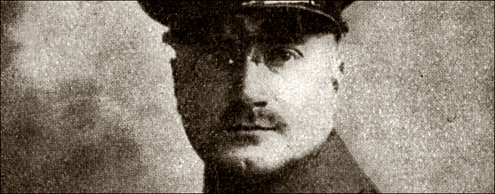
A u g u s t S t r a m m
(1874-1915)
Dämmerung
Hell weckt Dunkel
Dunkel wehrt Schein
Der Raum zersprengt die Räume
Fetzen ertrinken in Einsamkeit!
Die Seele tanzt
Und
Schwingt und schwingt
Und
Bebt im Raum
Du!
Meine Glieder suchen sich
Meine Glieder kosen sich
Meine Glieder
Schwingen sinken sinken ertrinken
In
Unermeßlichkeit
Du!
Hell wehrt Dunkel
Dunkel frißt Schein!
Der Raum ertrinkt in Einsamkeit
Die Seele
Strudelt
Sträubet
Halt!
Meine Glieder
Wirbeln
In
Unermeßlichkeit
Du!
Hell ist Schein!
Einsamkeit schlürft!
Unermeßlichkeit strömt
Zerreißt
Mich
In
Du!
Du!
August Stramm poetry
fleursdumal.nl magazine
More in: Archive S-T, Expressionism, Stramm, August
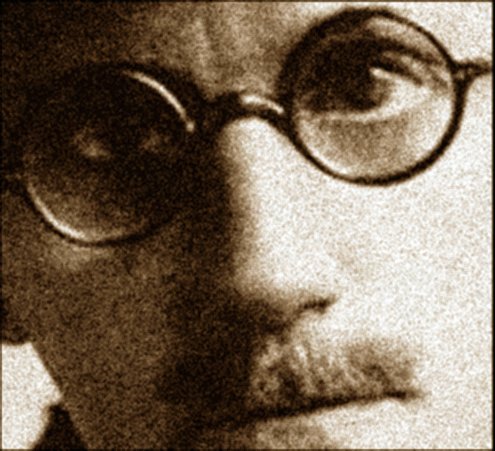
James Joyce
(1882-1941)
Dear Heart
Dear heart, why will you use me so?
Dear eyes that gently me upbraid,
Still are you beautiful — – but O,
How is your beauty raimented!
Through the clear mirror of your eyes,
Through the soft sigh of kiss to kiss,
Desolate winds assail with cries
The shadowy garden where love is.
And soon shall love dissolved be
When over us the wild winds blow —
But you, dear love, too dear to me,
Alas! why will you use me so?
Gentle Lady, Do Not Sing
Gentle lady, do not sing
Sad songs about the end of love;
Lay aside sadness and sing
How love that passes is enough.
Sing about the long deep sleep
Of lovers that are dead, and how
In the grave all love shall sleep:
Love is aweary now.
Though I Thy Mithridates Were
Though I thy Mithridates were,
Framed to defy the poison-dart,
Yet must thou fold me unaware
To know the rapture of thy heart,
And I but render and confess
The malice of thy tenderness.
For elegant and antique phrase,
Dearest, my lips wax all too wise;
Nor have I known a love whose praise
Our piping poets solemnize,
Neither a love where may not be
Ever so little falsity.
Thou Leanest to the Shell of Night
Thou leanest to the shell of night,
Dear lady, a divining ear.
In that soft choiring of delight
What sound hath made thy heart to fear?
Seemed it of rivers rushing forth
From the grey deserts of the north?
That mood of thine
Is his, if thou but scan it well,
Who a mad tale bequeaths to us
At ghosting hour conjurable — –
And all for some strange name he read
In Purchas or in Holinshed.
.jpg)
James Joyce poetry
kempis poetry magazine
More in: Joyce, James

Paul van Ostaijen
(1896-1928)
Zelfmoord des Zeemans
De zeeman
hij hoort de stem der Loreley
hij ziet op zijn horloge
en springt het water in

Loreley
Kom aan mijn borst
kom aan mijn borst
daar rust gij aan een lijf
dat eenzaam is een bedden van uw eenzaamheid
en eenzaam spelen uwe vingers
langs het ontwarren van lange wier
Achter de spiegel die verdrijft
de onbestendigheid der dingen
valt van uw handen het verlangen
aan mijn opalen huid verglijdend
een wezenloze droom
kom aan mijn borst
bed in mijn eenzaam’ armen
uw eenzaam lijf
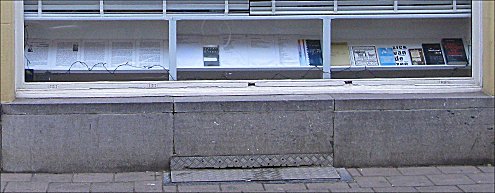
Geboortehuis Paul van Ostaijen
Lange Leemstraat, Antwerpen
kempis poetry magazine
More in: Historia Belgica, Museum of Literary Treasures, Ostaijen, Paul van
.jpg)
James Joyce
(1882-1941)
A Little Cloud
Eight years before he had seen his friend off at the North Wall and wished him godspeed. Gallaher had got on. You could tell that at once by his travelled air, his well-cut tweed suit, and fearless accent. Few fellows had talents like his and fewer still could remain unspoiled by such success. Gallaher’s heart was in the right place and he had deserved to win. It was something to have a friend like that.
Little Chandler’s thoughts ever since lunch-time had been of his meeting with Gallaher, of Gallaher’s invitation and of the great city London where Gallaher lived. He was called Little Chandler because, though he was but slightly under the average stature, he gave one the idea of being a little man. His hands were white and small, his frame was fragile, his voice was quiet and his manners were refined. He took the greatest care of his fair silken hair and moustache and used perfume discreetly on his handkerchief. The half-moons of his nails were perfect and when he smiled you caught a glimpse of a row of childish white teeth.
As he sat at his desk in the King’s Inns he thought what changes those eight years had brought. The friend whom he had known under a shabby and necessitous guise had become a brilliant figure on the London Press. He turned often from his tiresome writing to gaze out of the office window. The glow of a late autumn sunset covered the grass plots and walks. It cast a shower of kindly golden dust on the untidy nurses and decrepit old men who drowsed on the benches; it flickered upon all the moving figures, on the children who ran screaming along the gravel paths and on everyone who passed through the gardens. He watched the scene and thought of life; and (as always happened when he thought of life) he became sad. A gentle melancholy took possession of him. He felt how useless it was to struggle against fortune, this being the burden of wisdom which the ages had bequeathed to him.
He remembered the books of poetry upon his shelves at home. He had bought them in his bachelor days and many an evening, as he sat in the little room off the hall, he had been tempted to take one down from the bookshelf and read out something to his wife. But shyness had always held him back; and so the books had remained on their shelves. At times he repeated lines to himself and this consoled him.
When his hour had struck he stood up and took leave of his desk and of his fellow-clerks punctiliously. He emerged from under the feudal arch of the King’s Inns, a neat modest figure, and walked swiftly down Henrietta Street. The golden sunset was waning and the air had grown sharp. A horde of grimy children populated the street. They stood or ran in the roadway or crawled up the steps before the gaping doors or squatted like mice upon the thresholds. Little Chandler gave them no thought. He picked his way deftly through all that minute vermin-like life and under the shadow of the gaunt spectral mansions in which the old nobility of Dublin had roystered. No memory of the past touched him, for his mind was full of a present joy.
He had never been in Corless’s but he knew the value of the name. He knew that people went there after the theatre to eat oysters and drink liqueurs; and he had heard that the waiters there spoke French and German. Walking swiftly by at night he had seen cabs drawn up before the door and richly dressed ladies, escorted by cavaliers, alight and enter quickly. They wore noisy dresses and many wraps. Their faces were powdered and they caught up their dresses, when they touched earth, like alarmed Atalantas. He had always passed without turning his head to look. It was his habit to walk swiftly in the street even by day and whenever he found himself in the city late at night he hurried on his way apprehensively and excitedly. Sometimes, however, he courted the causes of his fear. He chose the darkest and narrowest streets and, as he walked boldly forward, the silence that was spread about his footsteps troubled him, the wandering, silent figures troubled him; and at times a sound of low fugitive laughter made him tremble like a leaf.
He turned to the right towards Capel Street. Ignatius Gallaher on the London Press! Who would have thought it possible eight years before? Still, now that he reviewed the past, Little Chandler could remember many signs of future greatness in his friend. People used to say that Ignatius Gallaher was wild Of course, he did mix with a rakish set of fellows at that time. drank freely and borrowed money on all sides. In the end he had got mixed up in some shady affair, some money transaction: at least, that was one version of his flight. But nobody denied him talent. There was always a certain . . . something in Ignatius Gallaher that impressed you in spite of yourself. Even when he was out at elbows and at his wits’ end for money he kept up a bold face. Little Chandler remembered (and the remembrance brought a slight flush of pride to his cheek) one of Ignatius Gallaher’s sayings when he was in a tight corner:
“Half time now, boys,” he used to say light-heartedly. “Where’s my considering cap?”
That was Ignatius Gallaher all out; and, damn it, you couldn’t but admire him for it.
Little Chandler quickened his pace. For the first time in his life he felt himself superior to the people he passed. For the first time his soul revolted against the dull inelegance of Capel Street. There was no doubt about it: if you wanted to succeed you had to go away. You could do nothing in Dublin. As he crossed Grattan Bridge he looked down the river towards the lower quays and pitied the poor stunted houses. They seemed to him a band of tramps, huddled together along the riverbanks, their old coats covered with dust and soot, stupefied by the panorama of sunset and waiting for the first chill of night bid them arise, shake themselves and begone. He wondered whether he could write a poem to express his idea. Perhaps Gallaher might be able to get it into some London paper for him. Could he write something original? He was not sure what idea he wished to express but the thought that a poetic moment had touched him took life within him like an infant hope. He stepped onward bravely.
Every step brought him nearer to London, farther from his own sober inartistic life. A light began to tremble on the horizon of his mind. He was not so old, thirty-two. His temperament might be said to be just at the point of maturity. There were so many different moods and impressions that he wished to express in verse. He felt them within him. He tried weigh his soul to see if it was a poet’s soul. Melancholy was the dominant note of his temperament, he thought, but it was a melancholy tempered by recurrences of faith and resignation and simple joy. If he could give expression to it in a book of poems perhaps men would listen. He would never be popular: he saw that. He could not sway the crowd but he might appeal to a little circle of kindred minds. The English critics, perhaps, would recognise him as one of the Celtic school by reason of the melancholy tone of his poems; besides that, he would put in allusions. He began to invent sentences and phrases from the notice which his book would get. “Mr. Chandler has the gift of easy and graceful verse.” . . . “wistful sadness pervades these poems.” . . . “The Celtic note.” It was a pity his name was not more Irish-looking. Perhaps it would be better to insert his mother’s name before the surname: Thomas Malone Chandler, or better still: T. Malone Chandler. He would speak to Gallaher about it.
He pursued his revery so ardently that he passed his street and had to turn back. As he came near Corless’s his former agitation began to overmaster him and he halted before the door in indecision. Finally he opened the door and entered.
The light and noise of the bar held him at the doorways for a few moments. He looked about him, but his sight was confused by the shining of many red and green wine-glasses The bar seemed to him to be full of people and he felt that the people were observing him curiously. He glanced quickly to right and left (frowning slightly to make his errand appear serious), but when his sight cleared a little he saw that nobody had turned to look at him: and there, sure enough, was Ignatius Gallaher leaning with his back against the counter and his feet planted far apart.
“Hallo, Tommy, old hero, here you are! What is it to be? What will you have? I’m taking whisky: better stuff than we get across the water. Soda? Lithia? No mineral? I’m the same Spoils the flavour. . . . Here, garçon, bring us two halves of malt whisky, like a good fellow. . . . Well, and how have you been pulling along since I saw you last? Dear God, how old we’re getting! Do you see any signs of aging in me, eh, what? A little grey and thin on the top, what?”
Ignatius Gallaher took off his hat and displayed a large closely cropped head. His face was heavy, pale and cleanshaven. His eyes, which were of bluish slate-colour, relieved his unhealthy pallor and shone out plainly above the vivid orange tie he wore. Between these rival features the lips appeared very long and shapeless and colourless. He bent his head and felt with two sympathetic fingers the thin hair at the crown. Little Chandler shook his head as a denial. Ignatius Galaher put on his hat again.
“It pulls you down,” be said, “Press life. Always hurry and scurry, looking for copy and sometimes not finding it: and then, always to have something new in your stuff. Damn proofs and printers, I say, for a few days. I’m deuced glad, I can tell you, to get back to the old country. Does a fellow good, a bit of a holiday. I feel a ton better since I landed again in dear dirty Dublin. . . . Here you are, Tommy. Water? Say when.”
Little Chandler allowed his whisky to be very much diluted.
“You don’t know what’s good for you, my boy,” said Ignatius Gallaher. “I drink mine neat.”
“I drink very little as a rule,” said Little Chandler modestly. “An odd half-one or so when I meet any of the old crowd: that’s all.”
“Ah well,” said Ignatius Gallaher, cheerfully, “here’s to us and to old times and old acquaintance.”
They clinked glasses and drank the toast.
“I met some of the old gang today,” said Ignatius Gallaher. “O’Hara seems to be in a bad way. What’s he doing?”
“Nothing,” said Little Chandler. “He’s gone to the dogs.”
“But Hogan has a good sit, hasn’t he?”
“Yes; he’s in the Land Commission.”
“I met him one night in London and he seemed to be very flush. . . . Poor O’Hara! Boose, I suppose?”
“Other things, too,” said Little Chandler shortly.
Ignatius Gallaher laughed.
“Tommy,” he said, “I see you haven’t changed an atom. You’re the very same serious person that used to lecture me on Sunday mornings when I had a sore head and a fur on my tongue. You’d want to knock about a bit in the world. Have you never been anywhere even for a trip?”
“I’ve been to the Isle of Man,” said Little Chandler.
Ignatius Gallaher laughed.
“The Isle of Man!” he said. “Go to London or Paris: Paris, for choice. That’d do you good.”
“Have you seen Paris?”
“I should think I have! I’ve knocked about there a little.”
“And is it really so beautiful as they say?” asked Little Chandler.
He sipped a little of his drink while Ignatius Gallaher finished his boldly.
“Beautiful?” said Ignatius Gallaher, pausing on the word and on the flavour of his drink. “It’s not so beautiful, you know. Of course, it is beautiful. . . . But it’s the life of Paris; that’s the thing. Ah, there’s no city like Paris for gaiety, movement, excitement. . . . ”
Little Chandler finished his whisky and, after some trouble, succeeded in catching the barman’s eye. He ordered the same again.
“I’ve been to the Moulin Rouge,” Ignatius Gallaher continued when the barman had removed their glasses, “and I’ve been to all the Bohemian cafes. Hot stuff! Not for a pious chap like you, Tommy.”
Little Chandler said nothing until the barman returned with two glasses: then he touched his friend’s glass lightly and reciprocated the former toast. He was beginning to feel somewhat disillusioned. Gallaher’s accent and way of expressing himself did not please him. There was something vulgar in his friend which he had not observed before. But perhaps it was only the result of living in London amid the bustle and competition of the Press. The old personal charm was still there under this new gaudy manner. And, after all, Gallaher had lived, he had seen the world. Little Chandler looked at his friend enviously.
“Everything in Paris is gay,” said Ignatius Gallaher. “They believe in enjoying life, and don’t you think they’re right? If you want to enjoy yourself properly you must go to Paris. And, mind you, they’ve a great feeling for the Irish there. When they heard I was from Ireland they were ready to eat me, man.”
Little Chandler took four or five sips from his glass.
“Tell me,” he said, “is it true that Paris is so . . . immoral as they say?”
Ignatius Gallaher made a catholic gesture with his right arm.
“Every place is immoral,” he said. “Of course you do find spicy bits in Paris. Go to one of the students’ balls, for instance. That’s lively, if you like, when the cocottes begin to let themselves loose. You know what they are, I suppose?”
“I’ve heard of them,” said Little Chandler.
Ignatius Gallaher drank off his whisky and shook his had.
“Ah,” he said, “you may say what you like. There’s no woman like the Parisienne, for style, for go.”
“Then it is an immoral city,” said Little Chandler, with timid insistence, “I mean, compared with London or Dublin?”
“London!” said Ignatius Gallaher. “It’s six of one and half-a-dozen of the other. You ask Hogan, my boy. I showed him a bit about London when he was over there. He’d open your eye. . . . I say, Tommy, don’t make punch of that whisky: liquor up.”
“No, really. . . . ”
“O, come on, another one won’t do you any harm. What is it? The same again, I suppose?”
“Well . . . all right.”
“François, the same again. . . . Will you smoke, Tommy?”
Ignatius Gallaher produced his cigar-case. The two friends lit their cigars and puffed at them in silence until their drinks were served.
“I’ll tell you my opinion,” said Ignatius Gallaher, emerging after some time from the clouds of smoke in which he had taken refuge, “it’s a rum world. Talk of immorality! I’ve heard of cases, what am I saying?, I’ve known them: cases of . . . immorality. . . . ”
Ignatius Gallaher puffed thoughtfully at his cigar and then, in a calm historian’s tone, he proceeded to sketch for his friend some pictures of the corruption which was rife abroad. He summarised the vices of many capitals and seemed inclined to award the palm to Berlin. Some things he could not vouch for (his friends had told him), but of others he had had personal experience. He spared neither rank nor caste. He revealed many of the secrets of religious houses on the Continent and described some of the practices which were fashionable in high society and ended by telling, with details, a story about an English duchess, a story which he knew to be true. Little Chandler as astonished.
“Ah, well,” said Ignatius Gallaher, “here we are in old jog-along Dublin where nothing is known of such things.”
“How dull you must find it,” said Little Chandler, “after all the other places you’ve seen!”
Well,” said Ignatius Gallaher, “it’s a relaxation to come over here, you know. And, after all, it’s the old country, as they say, isn’t it? You can’t help having a certain feeling for it. That’s human nature. . . . But tell me something about yourself. Hogan told me you had . . . tasted the joys of connubial bliss. Two years ago, wasn’t it?”
Little Chandler blushed and smiled.
“Yes,” he said. “I was married last May twelve months.”
“I hope it’s not too late in the day to offer my best wishes,” said Ignatius Gallaher. “I didn’t know your address or I’d have done so at the time.”
He extended his hand, which Little Chandler took.
“Well, Tommy,” he said, “I wish you and yours every joy in life, old chap, and tons of money, and may you never die till I shoot you. And that’s the wish of a sincere friend, an old friend. You know that?”
“I know that,” said Little Chandler.
“Any youngsters?” said Ignatius Gallaher.
Little Chandler blushed again.
“We have one child,” he said.
“Son or daughter?”
“A little boy.”
Ignatius Gallaher slapped his friend sonorously on the back.
“Bravo,” he said, “I wouldn’t doubt you, Tommy.”
Little Chandler smiled, looked confusedly at his glass and bit his lower lip with three childishly white front teeth.
“I hope you’ll spend an evening with us,” he said, “before you go back. My wife will be delighted to meet you. We can have a little music and, , ”
“Thanks awfully, old chap,” said Ignatius Gallaher, “I’m sorry we didn’t meet earlier. But I must leave tomorrow night.”
“Tonight, perhaps . . . ?”
“I’m awfully sorry, old man. You see I’m over here with another fellow, clever young chap he is too, and we arranged to go to a little card-party. Only for that . . . ”
“O, in that case . . . ”
“But who knows?” said Ignatius Gallaher considerately. “Next year I may take a little skip over here now that I’ve broken the ice. It’s only a pleasure deferred.”
“Very well,” said Little Chandler, “the next time you come we must have an evening together. That’s agreed now, isn’t it?”
“Yes, that’s agreed,” said Ignatius Gallaher. “Next year if I come, parole d’honneur.”
“And to clinch the bargain,” said Little Chandler, “we’ll just have one more now.”
Ignatius Gallaher took out a large gold watch and looked a it.
“Is it to be the last?” he said. “Because you know, I have an a.p.”
“O, yes, positively,” said Little Chandler.
“Very well, then,” said Ignatius Gallaher, “let us have another one as a deoc an doruis, that’s good vernacular for a small whisky, I believe.”
Little Chandler ordered the drinks. The blush which had risen to his face a few moments before was establishing itself. A trifle made him blush at any time: and now he felt warm and excited. Three small whiskies had gone to his head and Gallaher’s strong cigar had confused his mind, for he was a delicate and abstinent person. The adventure of meeting Gallaher after eight years, of finding himself with Gallaher in Corless’s surrounded by lights and noise, of listening to Gallaher’s stories and of sharing for a brief space Gallaher’s vagrant and triumphant life, upset the equipoise of his sensitive nature. He felt acutely the contrast between his own life and his friend’s and it seemed to him unjust. Gallaher was his inferior in birth and education. He was sure that he could do something better than his friend had ever done, or could ever do, something higher than mere tawdry journalism if he only got the chance. What was it that stood in his way? His unfortunate timidity He wished to vindicate himself in some way, to assert his manhood. He saw behind Gallaher’s refusal of his invitation. Gallaher was only patronising him by his friendliness just as he was patronising Ireland by his visit.
The barman brought their drinks. Little Chandler pushed one glass towards his friend and took up the other boldly.
“Who knows?” he said, as they lifted their glasses. “When you come next year I may have the pleasure of wishing long life and happiness to Mr. and Mrs. Ignatius Gallaher.”
Ignatius Gallaher in the act of drinking closed one eye expressively over the rim of his glass. When he had drunk he smacked his lips decisively, set down his glass and said:
“No blooming fear of that, my boy. I’m going to have my fling first and see a bit of life and the world before I put my head in the sack, if I ever do.”
“Some day you will,” said Little Chandler calmly.
Ignatius Gallaher turned his orange tie and slate-blue eyes full upon his friend.
“You think so?” he said.
“You’ll put your head in the sack,” repeated Little Chandler stoutly, “like everyone else if you can find the girl.”
He had slightly emphasised his tone and he was aware that he had betrayed himself; but, though the colour had heightened in his cheek, he did not flinch from his friend’s gaze. Ignatius Gallaher watched him for a few moments and then said:
“If ever it occurs, you may bet your bottom dollar there’ll be no mooning and spooning about it. I mean to marry money. She’ll have a good fat account at the bank or she won’t do for me.”
Little Chandler shook his head.
“Why, man alive,” said Ignatius Gallaher, vehemently, “do you know what it is? I’ve only to say the word and tomorrow I can have the woman and the cash. You don’t believe it? Well, I know it. There are hundreds, what am I saying?, thousands of rich Germans and Jews, rotten with money, that’d only be too glad. . . . You wait a while my boy. See if I don’t play my cards properly. When I go about a thing I mean business, I tell you. You just wait.”
He tossed his glass to his mouth, finished his drink and laughed loudly. Then he looked thoughtfully before him and said in a calmer tone:
“But I’m in no hurry. They can wait. I don’t fancy tying myself up to one woman, you know.”
He imitated with his mouth the act of tasting and made a wry face.
“Must get a bit stale, I should think,” he said.
Little Chandler sat in the room off the hall, holding a child in his arms. To save money they kept no servant but Annie’s young sister Monica came for an hour or so in the morning and an hour or so in the evening to help. But Monica had gone home long ago. It was a quarter to nine. Little Chandler had come home late for tea and, moreover, he had forgotten to bring Annie home the parcel of coffee from Bewley’s. Of course she was in a bad humour and gave him short answers. She said she would do without any tea but when it came near the time at which the shop at the corner closed she decided to go out herself for a quarter of a pound of tea and two pounds of sugar. She put the sleeping child deftly in his arms and said:
“Here. Don’t waken him.”
A little lamp with a white china shade stood upon the table and its light fell over a photograph which was enclosed in a frame of crumpled horn. It was Annie’s photograph. Little Chandler looked at it, pausing at the thin tight lips. She wore the pale blue summer blouse which he had brought her home as a present one Saturday. It had cost him ten and elevenpence; but what an agony of nervousness it had cost him! How he had suffered that day, waiting at the shop door until the shop was empty, standing at the counter and trying to appear at his ease while the girl piled ladies’ blouses before him, paying at the desk and forgetting to take up the odd penny of his change, being called back by the cashier, and finally, striving to hide his blushes as he left the shop by examining the parcel to see if it was securely tied. When he brought the blouse home Annie kissed him and said it was very pretty and stylish; but when she heard the price she threw the blouse on the table and said it was a regular swindle to charge ten and elevenpence for it. At first she wanted to take it back but when she tried it on she was delighted with it, especially with the make of the sleeves, and kissed him and said he was very good to think of her.
Hm! . . .
He looked coldly into the eyes of the photograph and they answered coldly. Certainly they were pretty and the face itself was pretty. But he found something mean in it. Why was it so unconscious and ladylike? The composure of the eyes irritated him. They repelled him and defied him: there was no passion in them, no rapture. He thought of what Gallaher had said about rich Jewesses. Those dark Oriental eyes, he thought, how full they are of passion, of voluptuous longing! . . . Why had he married the eyes in the photograph?
He caught himself up at the question and glanced nervously round the room. He found something mean in the pretty furniture which he had bought for his house on the hire system. Annie had chosen it herself and it reminded him of her. It too was prim and pretty. A dull resentment against his life awoke within him. Could he not escape from his little house? Was it too late for him to try to live bravely like Gallaher? Could he go to London? There was the furniture still to be paid for. If he could only write a book and get it published, that might open the way for him.
A volume of Byron’s poems lay before him on the table. He opened it cautiously with his left hand lest he should waken the child and began to read the first poem in the book:
Hushed are the winds and still the evening gloom,
Not e’en a Zephyr wanders through the grove,
Whilst I return to view my Margaret’s tomb
And scatter flowers on the dust I love.
He paused. He felt the rhythm of the verse about him in the room. How melancholy it was! Could he, too, write like that, express the melancholy of his soul in verse? There were so many things he wanted to describe: his sensation of a few hours before on Grattan Bridge, for example. If he could get back again into that mood. . . .
The child awoke and began to cry. He turned from the page and tried to hush it: but it would not be hushed. He began to rock it to and fro in his arms but its wailing cry grew keener. He rocked it faster while his eyes began to read the second stanza:
Within this narrow cell reclines her clay,
That clay where once . . .
It was useless. He couldn’t read. He couldn’t do anything. The wailing of the child pierced the drum of his ear. It was useless, useless! He was a prisoner for life. His arms trembled with anger and suddenly bending to the child’s face he shouted:
“Stop!”
The child stopped for an instant, had a spasm of fright and began to scream. He jumped up from his chair and walked hastily up and down the room with the child in his arms. It began to sob piteously, losing its breath for four or five seconds, and then bursting out anew. The thin walls of the room echoed the sound. He tried to soothe it but it sobbed more convulsively. He looked at the contracted and quivering face of the child and began to be alarmed. He counted seven sobs without a break between them and caught the child to his breast in fright. If it died! . . .
The door was burst open and a young woman ran in, panting.
“What is it? What is it?” she cried.
The child, hearing its mother’s voice, broke out into a paroxysm of sobbing.
“It’s nothing, Annie . . . it’s nothing. . . . He began to cry . . . ”
She flung her parcels on the floor and snatched the child from him.
“What have you done to him?” she cried, glaring into his face.
Little Chandler sustained for one moment the gaze of her eyes and his heart closed together as he met the hatred in them. He began to stammer:
“It’s nothing. . . . He . . . he began to cry. . . . I couldn’t . . . I didn’t do anything. . . . What?”
Giving no heed to him she began to walk up and down the room, clasping the child tightly in her arms and murmuring:
“My little man! My little mannie! Was ’ou frightened, love? . . . There now, love! There now!… Lambabaun! Mamma’s little lamb of the world! . . . There now!”
Little Chandler felt his cheeks suffused with shame and he stood back out of the lamplight. He listened while the paroxysm of the child’s sobbing grew less and less; and tears of remorse started to his eyes.
.jpg)
James Joyce: A Little Cloud
kempis poetry magazine
More in: Archive I-J, Joyce, James, Joyce, James
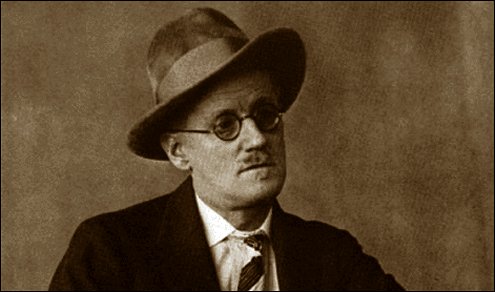
James Joyce
(1882-1941)
The Ballad of Persse O’Reilly
Have you heard of one Humpty Dumpty
How he fell with a roll and a rumble
And curled up like Lord Olofa Crumple
By the butt of the Magazine Wall,
(Chorus) Of the Magazine Wall,
Hump, helmet and all?
He was one time our King of the Castle
Now he’s kicked about like a rotten old parsnip.
And from Green street he’ll be sent by order of His Worship
To the penal jail of Mountjoy
(Chorus) To the jail of Mountjoy!
Jail him and joy.
He was fafafather of all schemes for to bother us
Slow coaches and immaculate contraceptives for the populace,
Mare’s milk for the sick, seven dry Sundays a week,
Openair love and religion’s reform,
(Chorus) And religious reform,
Hideous in form.
Arrah, why, says you, couldn’t he manage it?
I’ll go bail, my fine dairyman darling,
Like the bumping bull of the Cassidys
All your butter is in your horns.
(Chorus) His butter is in his horns.
Butter his horns!
(Repeat) Hurrah there, Hosty, frosty Hosty, change that shirt
on ye,
Rhyme the rann, the king of all ranns!
Balbaccio, balbuccio!
We had chaw chaw chops, chairs, chewing gum, the chicken-pox
and china chambers
Universally provided by this soffsoaping salesman.
Small wonder He’ll Cheat E’erawan our local lads nicknamed him.
When Chimpden first took the floor
(Chorus) With his bucketshop store
Down Bargainweg, Lower.
So snug he was in his hotel premises sumptuous
But soon we’ll bonfire all his trash, tricks and trumpery
And ’tis short till sheriff Clancy’ll be winding up his unlimited
company
With the bailiff’s bom at the door,
(Chorus) Bimbam at the door.
Then he’ll bum no more.
Sweet bad luck on the waves washed to our island
The hooker of that hammerfast viking
And Gall’s curse on the day when Eblana bay
Saw his black and tan man-o’-war.
(Chorus) Saw his man-o’-war
On the harbour bar.
Where from? roars Poolbeg. Cookingha’pence, he bawls
Donnez-moi scampitle, wick an wipin’fampiny
Fingal Mac Oscar Onesine Bargearse Boniface
Thok’s min gammelhole Norveegickers moniker
Og as ay are at gammelhore Norveegickers cod.
(Chorus) A Norwegian camel old cod.
He is, begod.
Lift it, Hosty, lift it, ye devil, ye! up with the rann,
the rhyming rann!
It was during some fresh water garden pumping
Or, according to the Nursing Mirror, while admiring the monkeys
That our heavyweight heathen Humpharey
Made bold a maid to woo
(Chorus) Woohoo, what’ll she doo!
The general lost her maidenloo!
He ought to blush for himself, the old hayheaded philosopher,
For to go and shove himself that way on top of her.
Begob, he’s the crux of the catalogue
Of our antediluvial zoo,
(Chorus) Messrs Billing and Coo.
Noah’s larks, good as noo.
He was joulting by Wellinton’s monument
Our rotorious hippopopotamuns
When some bugger let down the backtrap of the omnibus
And he caught his death of fusiliers,
(Chorus) With his rent in his rears.
Give him six years.
‘Tis sore pity for his innocent poor children
But look out for his missus legitimate!
When that frew gets a grip of old Earwicker
Won’t there be earwigs on the green?
(Chorus) Big earwigs on the green,
The largest ever you seen.
Suffoclose! Shikespower! Seudodanto! Anonymoses!
Then we’ll have a free trade Gael’s band and mass meeting
For to sod him the brave son of Scandiknavery.
And we’ll bury him down in Oxmanstown
Along with the devil and the Danes,
(Chorus) With the deaf and dumb Danes,
And all their remains.
And not all the king’s men nor his horses
Will resurrect his corpus
For there’s no true spell in Connacht or hell
(bis) That’s able to raise a Cain.

James Joyce poetry
kempis poetry magazine
More in: Joyce, James
Thank you for reading Fleurs du Mal - magazine for art & literature